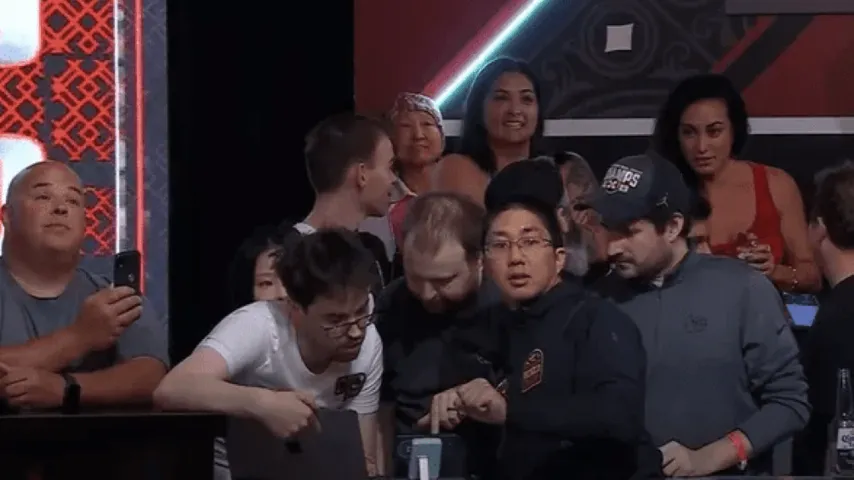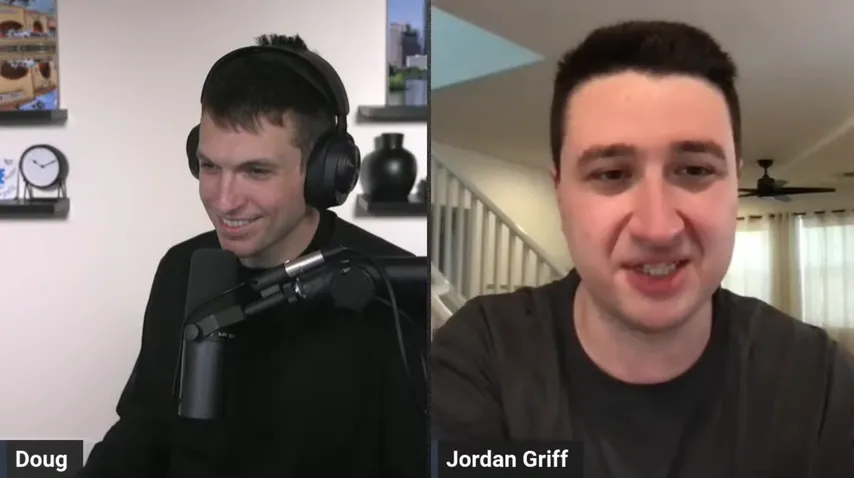After the 2024 Main Event wrapped up, the poker community was set ablaze by images, accusations, and tweets.
Jonathan Tamayo was seen running back and forth from his rail, which included Joe Mckeehen and Dominik Nitsche. In front of those two was a laptop running some type of poker program, simulating hands to assist Tamayo.
We covered this in greater detail, which you can view below.
Read ReadAfter Doug Polk's first video on the incident, he followed up by bringing the Main Event 2nd place winner on his channel. Jordan Griff was directly involved and his firsthand perspective was very interesting to the fans. In the first 24 hours, the video with Jordan racked up around 145,000 views.
We took the most important points from Jordan Griff's chat with Polk.
Doug Polk: At what point did you notice the laptop shenanigans going on?
Jordan Griff: You know, I saw him calling things out. I saw him going to the rail, but at no point did I see what was on the laptop or try to eavesdrop on what he was saying. In any sport, you don't go over to the other team's sideline, the other team's dugout, and say, "Hey, what film are you guys looking at?" or "Can I take a look?"
So there may have been suspicions in my mind, but I thought that if there was anything nefarious going on, like there as we saw, there were cameras that caught it. People on stream, people within production for the WSOP could have caught that. I thought that if they were doing anything nefarious or against the rules that it would have been called out or caught on. But when I'm at the table in that moment, I'm focused on playing. I'm not trying to focus on who he has as a solver. If he did, I'm just there to play my game. I'm there to play straight poker and try and take that thing down.
Polk: Yeah, that's a good approach. You would think that there would be some line where the WSOP floor would step in. I actually think it's kind of interesting that they didn't step in when we saw the laptop.
What did you think when you first saw the image of what was actually on that laptop?

Griff: I mean, I think one of the things I was thinking back to was those announcements at the start of each tournament that you can't use RTAs or anything. So I knew it was kind of against the rules, but also, that announcement follows with, "You could be penalized," and I don't think people have really been strongly penalized by it. So I'm sure in their mind, if they knew they were doing something wrong, they're like, "Oh, well, they'll just tell us to put the laptop away." I don't think there were any serious repercussions people thought would come out of that.
Polk: Was that announcement made in the WSOP Main Event as well?
Griff: I'm pretty sure it was. My mind is a bit mushed from each day, but I remember specifically hearing that myself, and I only played about three tournaments at the WSOP this year.
Polk:: Man, that was just like 180 hours. You should just recall clearly. It's a weird way, "I only played three tournaments." Okay, but how long did one of those tournaments go for? I mean, you were there for a super long time.
Was there any talk from anyone about the laptop situation? Or is it just totally flying basically, I won't say under the radar, but just not really a focal point for any of the players?
Griff: To be honest, I wasn't focused on him prior to heads-up. I think heads up is really when people started to take notice and really say things about it. That's where a lot of those laptop images I saw come from, was that last day.
Polk: Do you feel that the usage of this stuff in the tournament put you at an unfair disadvantage?
Griff: It's tough to say. I mean, I think using an RTA is going to give an advantage. Everyone can debate how large that is and how much it will really help a person. I think it's hard to quantify that. A lot of people are coming out and saying, "Oh, it's so small, you can't even worry about that.
You know, I just know it's not allowed based on what WSOP is saying. And yeah, I'm not really focused on how big of an edge versus how big it isn't. Even just, you know, that tournament, it's like we talk about it being decided by a flip. Or you know, I got it in again another time with like 30% plus equity. I don't know how things would have been different if they weren't using the solver.
But it's even just sad that this is what the story out of the main event is. It should be positive stuff. It should be great stories about people making these deep runs and coming into money, and trying to be ambassadors for the game. And here we are talking about someone who's trying to take every little edge they can and use that to their advantage.

Polk: Yeah, that is what it has become.
If you knew what was going on over there on Tamayo's base camp, would you have done anything differently?
Griff: That's a good question. If I had 100% confirmation that they were there running sims, I may have mentioned something to the floor then and said, "Hey, is that allowed? Is this something they can do?" But, you know, I was just trying to enjoy the moment. I wasn't trying to dampen it. And I would, I was assuming that WSOP would be enforcing any rules that they have in place and monitoring that.
Polk: Well, that assumption might have been a little bit off there.

– Jordan Griff told Doug that he would be open to going down the legal path, but fully acknowledges that Jonathan Tamayo won the heads-up battle "whether he got assistance or not." He also added that
On lawsuits, Griff said, "I would say it's always a possibility, but I'm not, you know, I'm not sure at this time."
Social Media Reacts to Tamayo's Conduct at WSOP Main Event
Tamayo has been mostly silent on social media, but Dominik Nitsche has been vocal. He manned the laptop and as a result, faced questions and accusations from the public.
Far from being apologetic, Nitsche seems to be fully accepting of his newfound villain status.
– "Because you've broken WSOP rules?" one viewer asked.
– "Promocode WSOPRULES is next week" Dominik quickly replied.
He also clashed with Daniel Negreanu over multiple tweets, seemingly holding nothing back.
"Well said," Hellmuth gave his approval.
Dominik responded by denying wrongdoing, saying he was within the rules, and even pointed fingers at Espen Jørstad for having first-hand knowledge during a tournament. Espen quickly responded and Dominik apologized, not helping his credibility much.
While vouching for his own innocence, Dominik seems to understand that having electronic assistance could create a bad atmosphere for recreational players; the lifeblood of the game. He responded to Matt Savage's Twitter poll on phones during games, saying, "It depends on whether we want to make poker more professional or casual going forward," and "We can't turn poker into chess."
However, that's probably what would happen if everyone approached the final table as he, Tamayo, and Mckeehen did. Players would be an amalgamation of human intellect and solver strategies, hardly what the fans want to see.
Joshua Arieh, like plenty of others, highlighted the contrast between verbal coaching and using solvers at the rail:
"There has been coaches involved at final tables as far back as I can remember. There has never been one person come out and say “oh it wasn’t fair, he had Shaun Deeb helping him”.
But here we are, comparing coaches to a computer running 5 million hands at a certain stack depth to instantly run an optimal sizing strategy."
But, as usual, Dominik didn't agree.
– "I'd say you have very little idea as to how any of this software works.
And even less of an idea as to what material we had prepared"
Alan Keating, well-known for high-stakes cash games (not MTTs), chimed in:
Dominik took the offensive:
"What's funny is that you acting like an absolute clown on stream to get whale action in private games isn't exactly anyone's definition of "spirit of the game" either.
I prefer competing over sucking up to rich guys"
Keating's response was short and sweet:
– "You know nothing of what you speak."
There must be thousands of comments on Tamayo's win at this point, so we recommend you browse Twitter to get the full picture. However, opinions are near-unanimous, with only a few arguing for Dominik's side.
As usual, we can look to Will Jaffe for a worthwhile opinion:
Sam Greenwood called it, "closer to petty theft than grand larceny."
Sam Grafton commented on the same video, saying, "Absolutely sucks and can’t be allowed."
Fedor Holz also gave his two cents:
Almost everyone agrees that something needs to change, though the degree to which varies from person to person.
Read ReadDaniel Negreanu, Alan Keating, and Polk Discuss the Situation
Following the interview with Jordan Griff, Doug Polk continued diving deep into the issue. Alan Keating and Daniel Negreanu chatted with Polk on a video call.
To Keating, Doug asked, "You said you had a lot of friends that had an opinion about this tournament. What were some of the things they were telling you?"
Alan Keating: I think even before this tournament, a lot of players that don't play for a living were thinking of these tournaments, people are playing tighter, headphones everywhere, that kind of stuff. Maybe there's some mystique lost from it and a little frustration. Then when we saw the laptop on the side of the table, people were looking at each other like, "Isn't that cheating? Is someone gonna jump in? What's going on here? Is this the direction? If I made the final table, would I be going against that stuff?" What dream is for tournament players now?
Doug Polk: Daniel, what do you think about that?
Daniel Negreanu: Yeah, I completely agree.
Yeah, I think that laptop itself isn't the issue. It's a question of what you're using the laptop for. One of the things that's difficult in terms of creating rules to enforce this thing is you have a crowd of, let's say, two or three hundred people. It's very difficult to know what everybody is looking at on their laptops, on their phones, and all this sort of thing.

A friend going to the rail and saying, "Hey man, I don't know," that's always been fine, totally kosher. Talk to your boys, say, "Man up, guy's never bluffing you, he's got a tell," all that stuff. What's new now that didn't exist for the last decade is the tools available today coming from AI solvers and this sort of thing.
I think, in part, it's probably a good thing this happened on the biggest stage because now it's a conversation we all have to have.
Polk: What's the sentiment on the other side, Allan? Because you know so many people that are the casual people that just dip their toes in and see this kind of thing. What do they think when they see this?
Keating: See, even if you don't have a big stack, these situations aren't very complex. If it's just all-in or fold or something like that, then it looks like the computer was playing poker for them.
Polk: But I'm seeing so many of these comments on stuff that I've been posting, like, "Oh, he lost, the computer beat him, this is rigged, the computer got him." So that's a real imaging problem, right? Would you say, Alan? Because it's like, if people just think the computer is beating you, how do we tell those people?
Keating: I don't think we tell them they're wrong. I think the course of action is to push to these tournaments and say, "We need a rule change here. These things need to be banned, and no ifs, ands, or buts. Everyone needs to get on board with this.
Enforcing the Rules at the WSOP
Negreanu: I would say though that rather than a rule change, more aggressive enforcement of rules that already exists. Even Nevada gaming has rules against this sort of thing. They're specifically more geared towards casino games, like you can't use any sort of aid in Blackjack or Craps, but it does extend to poker too. There is wording and there is language in there that says you cannot use anything like this.
I think the thing to focus on now that we have to do going forward to your point Allan is like make these rules as clear as possible. I think something to the effect of "No use of solvers at any point in the tournament area", which is defined by the entire room, and any use of this could lead to a disqualification. And then when you put in "use of solver", that includes you know, getting text messages or information from somebody using one and relaying that to you, right? Because you're gonna have guys that are saying loopholes, "Well Jonathan didn't do any solves, Jonathan wasn't doing anything, he was just looking at what was prepared for him."
Right, and on that point too, I think it's important for people to differentiate like whether if he's looking at hands that were already played and they're bre- who cares, like that's not a big deal. Getting the solve for a hand that was played before doesn't necessarily help you for the ones going forward. The issue is the real-time assistant, if you will, is when the next hand's about to be dealt and you've just been spoonfed ranges that came from a computer.
– Watch the full hour and 45-minute long video to get more of Keating, Negreanu, and Polk's thoughts on this issue.
Read Read